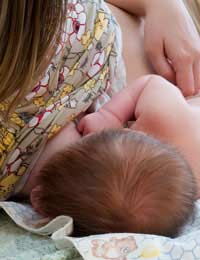Maintaining a Healthy Diet When Breast-feeding

Many women mistakenly believe that when they give birth, their careful eating habits can go out the window. But if you are planning to breastfeed, maintaining a healthy diet is important.
Your baby will get the full nutrition of your breast milk no matter what you eat, but if you eat too little, or if you eat certain foods that are irritants, he or she may suffer.
Women who breast-feed should also avoid drinking too much alcohol, and should have water on hand when they are breastfeeding, as many find it makes them thirsty. How much liquid you consume will not affect your milk production.
Allergies and Irritants
As women breastfeed, some notice that certain foods seem to irritate their babies, upsetting their digestive tract or affecting their natural sleep patterns. Common culprits are vegetables such as cauliflower and cabbage, which can give some babies wind, and caffeinated drinks such as coffee, tea and some fizzy drinks.Coffee, for example, may have the same effect on a baby as it does a grown-up, and you may find yours finds it difficult to sleep if you’ve had too many cuppas. In that same vein, some babies sleep well if you’ve had a glass of wine.
If your baby seems irritated by certain foods, keep track of what you eat and then cut them out of your diet, to see if there is any improvement. What bothers one baby may not bother another, so it’s a case of trial and error.
Food Allergies in Babies
Occasionally, the effect of something you eat has a more profound effect than inducing colic or wind. Dairy, peanuts, egg, wheat and soya can all trigger allergies in babies, although experts say only about four per cent are affected.If you have severe food allergies, or if there is a family history of them, it is advised to avoid giving them to your baby in the first year of life, and that includes within your breast milk.
Keep in mind that siblings often do not have the same allergies. So if you have a family history of peanut allergies but your first child has no allergies whatsoever, your second child might still have them. Be vigilant.
Resist the Urge to Diet
Many women wonder if following a diet while breast-feeding can harm their baby. While losing the pounds put on during pregnancy is a priority for many new mums, going on a diet while breast-feeding is not a good idea.Health professionals recommend that healthy eating, combined with regular, moderate exercise, is the best way for new mums to lose weight after pregnancy.
Slow and steady is the way to go. Losing weight too rapidly can release toxins stored in the bloodstream into the body, which can enter the breast milk and harm your child.
Healthy Eating Habits for Life
Some experts recommend that a breast-feeding mum needs to up her food intake by 500 calories a day. But most people agree that it’s not the calories that matter, it’s what you eat.Women who breastfeed should build the following foods into their daily diet, a diet which can be the foundation of healthy eating for life:
- Complex carbohydrates
- Vegetables, such as beans, cauliflower and broccoli
- Wholegrains, such as brown rice and wholemeal bread
- Dairy products, such as low-fat milk and yoghurt (you need about 1,000 mg of calcium a day whilst breastfeeding, which can come from dairy or other foods such as broccoli and tofu)
- Fish and lean meat or chicken
- Is a Vegan Diet Healthy?
- Ten Easy Changes You Can Make to Lose Weight
- Cooking Healthily to Keep Your Family Slim
- Eating Healthily to Lower Blood Pressure
- Dietary Nutritional Values of 8,000 Foods
- Slimming Effects of Caffeine
- A Little Thing Called Lecithin
- Avoiding Digestive and Gastrointestinal Disorders
- Choline Prevents Homocysteine Build-up
- Findings About Chocolate
- Fruits Are Your Friends
- How to Curb Your Cravings
- Meat Free Diet and Iron
- The Soy Story
- Zinc and Exercise
- Nutritional Support for Allergies
- Six Tips for Healthy Weight Loss
- Daily Nutrition: Optimal Allowances


Re: Reducing Fat and Building Muscle
Kak esehiko sminor k112 safeslimming.co.uk
Re: Is Coriander Juice Useful for Weight Reduction?
i want loss my lower body weight like belly hips weight it drink help me for loss weight its possible so…
Re: Is Coriander Juice Useful for Weight Reduction?
I want to reduce my Weight 10kgs with any proper diet please suggest something.
Re: Is Coriander Juice Useful for Weight Reduction?
I want to loose my belly fat in one week but without dieting. Does coriander juice will work?
Re: Advantages and Disadvantages of a Low-fat Diet
Why is this website titled advantages and disadvantages of a low-fat diet if it says nothing about that. I…
Re: Is Coriander Juice Useful for Weight Reduction?
So is it unhealthy? I started drinking it today...
Re: Is Coriander Juice Useful for Weight Reduction?
I want to reduce tummy fat within a month ...I am doing nothing... Please come up with good reply One…
Re: Is Coriander Juice Useful for Weight Reduction?
I have weight loss of 10 kgs what makes
Re: Is Coriander Juice Useful for Weight Reduction?
I want to reduce my tummy fat bt i dont have too much time ,i can do 30 min walk evryday...so it will…
Re: Is Coriander Juice Useful for Weight Reduction?
I want to loose 10 kg weight in 10 days but without dieting and exercise. Please suggest me how to get slim.